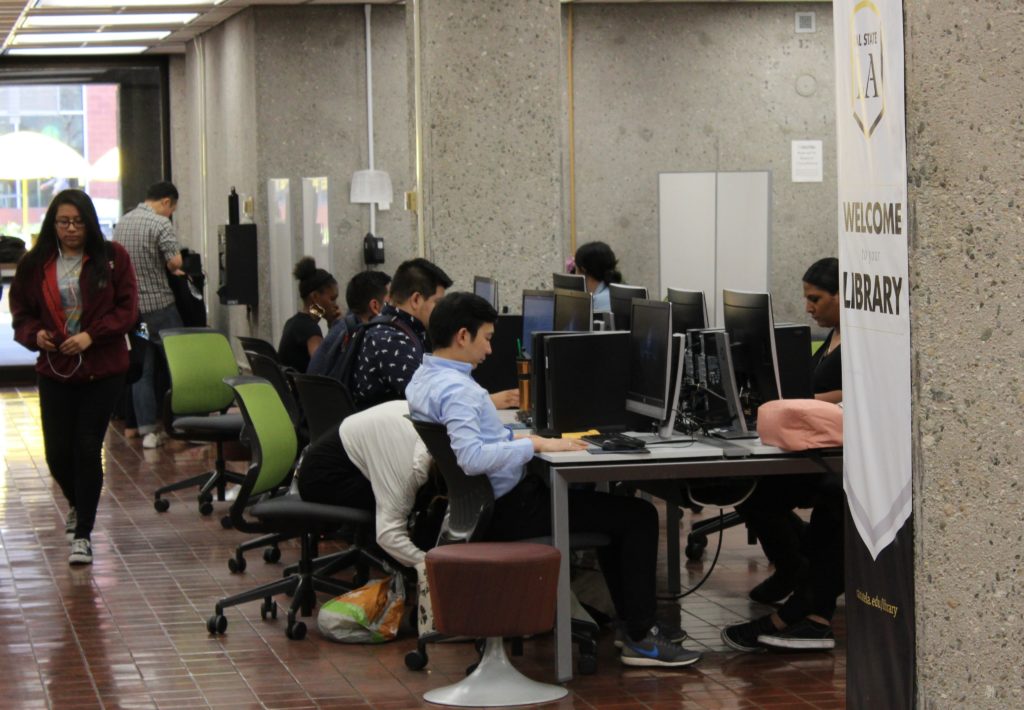Students study at Cal State LA library.
Larry Gordon/EdSource
My academic career was delayed and nearly derailed by ADHD, and I didn’t have a clue.
I started my academic journey in 2002. At the time, I had a 2-year-old son with another child on the way. I enrolled at the University of New Mexico and, within a few years, started working part time as a mental health technician at a youth mental hospital. Little did I know that a single, off-the-cuff conversation with one of the doctors there would change my life forever.
He asked if I had ever been diagnosed with ADHD (attention deficit/hyperactivity disorder), which, to me, was an absurd question to ask because I am certainly not hyperactive. At the time, when I thought of ADHD, I imagined little kids running around like they had just drunk 2 liters of soda. I can’t remember what answer I gave him, but his question planted a seed in my brain, and there it remained for years.
While I loved studying photojournalism at that time, my grades gradually went from OK to bad. I didn’t have a problem understanding the concepts. I struggled with time management, completing tasks and procrastination.
I had responsibilities. I thought it best to return home to California and pivot. In 2009, I dropped out of college and became a freelance photographer, shooting everything from weddings to commercial photography. I missed college and photojournalism, but I needed to pay bills.
Fast-forward to 2017. With both my boys now attending high school, I re-evaluated my first attempt at college to see where I went wrong.
Reflecting on the conversation about ADHD I had years ago, I decided to consult my doctor and a psychiatrist. I was diagnosed with a condition called attention-deficit/hyperactivity disorder, predominantly inattentive or ADHD-PI.
The American Psychiatric Association’s Diagnostic and Statistical Manual of Mental Disorders offered me this explanation: “Inattention manifests behaviorally in ADHD as wandering off task, lacking persistence, having difficulty sustaining focus, and being disorganized and is not due to defiance or lack of comprehension.”
All this gave me flashbacks to high school. I clearly remember the decline in my attention span. I was reading books by authors like Michael Crichton, Anne Rice and Carl Sagan before my freshman year. By the end of that same year, I struggled to retain anything I read from a few pages of a class textbook.
I had so many thoughts in my head, and they were all vying for my attention simultaneously. A song I heard the day before, a conversation with a friend, a scene from a movie I hadn’t seen in years. It felt like trying to read a book while in a packed sports bar during the Super Bowl. These explanations for my inattentiveness and procrastination were seen as thinly veiled excuses and had been regularly dismissed by teachers, counselors and my parents. They told me I was lazy and needed to snap out of it. I never could.
I am not alone. Roughly 3% of adults in the U.S. live with inattentive ADHD, the most common variation of the disorder.
Talk about a revelation. I had been fighting with one hand tied behind my back and didn’t even know it. When I realized what I was dealing with, I did my research and found ways to manage the effects.
I created an office space free from distractions like loud conversations and easily accessible video game controllers. I don’t often play video games, but giving in to a quick game of Call of Duty can send me down a rabbit hole of distractions that can easily consume hours of my time.
I also started using apps like Calendar, Reminders and Evernote to keep track of notes, appointments, tasks and deadlines.
I restarted my academic journey in 2019 at Pasadena City College, and at 41 years old, I approached it with care and discipline. In two and a half years, I graduated with two associate degrees, in communication arts and social and behavioral sciences.
Next, I enrolled in Cal State LA in 2022, ready to knock out two more degrees.
I wrote notes for every class lecture and every reading and class assignment. By the time I graduated, I had amassed a collection of 65 notebooks, one for each class I took.
My ADHD made it hard to retain what I read, so I used text-to-speech features to make my laptop read my books aloud while I read along. Also, I isolated myself. I used my noise-canceling headphones to study as if in the silence of a monastery.
When I returned to college, I placed myself in a better place to succeed. My kids were old enough to take care of themselves. I had my ADHD in check and built an incredible support structure among professors and therapists. The support of my family helped immensely.
And, I was blessed with professors who understood what I had on my plate.
Today, I am chasing a master’s degree. And I will not care whether a fellow student asks me “Are you a professor?” Every gray hair holds a story worth telling.
•••
Xavier Zamora recently graduated from Cal State LA with a double major in journalism and TV, film and media studies. He is a member of the EdSource Student Journalism Corps.
The opinions in this commentary are those of the author. We welcome guest commentaries with diverse points of view. If you would like to submit a commentary, please review our guidelines and contact us.

